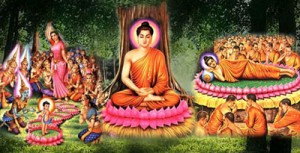Visakha Bucha Day
Visakha Bucha Day is an important religious festival in the Buddhist calendar, falling usually in May on the full moon day of the sixth lunar month. When a year has an extra eighth lunar month –Adhikamasa (13 full moons in the year) – Visakha Bucha Day falls on the full moon day of the seventh lunar month.
On Visakha Bucha Day, Buddhists all over the world commemorate events of significance to Buddhists of all traditions: The birth, enlightenment and the passing away of Gautama Buddha. As Buddhism spread from India it was assimilated into many foreign cultures, and consequently Visakha is celebrated in many different ways all over the world. In India, Vaishakh Purnima day is also known as Buddha Jayanti day and has been traditionally accepted as Buddha’s birth day.
In 1999, the United Nations resolved to internationally observe the day of Visakha at its headquarters and offices.
The temples will display a small statue of the Buddha in front of the altar in a small basin filled with water and decorated with flowers, allowing devotees to pour water over the statue; it is symbolic of the cleansing of a practitioner’s bad karma, and to reenact the events following the Buddha’s birth, when devas and spirits made heavenly offerings to him.
Devout Buddhists will rise early to make merit at temples. In some temples, Buddhists will perform “Wien Tien” in the evenings, circling the bodh, or main sermon or prayer hall, carrying candles, incense and lotus flowers.
Devotees are expected to listen to talks given by monks. On this day monks will recite verses uttered by the Buddha twenty-five centuries ago, to invoke peace and happiness for the government and the people. Buddhists are reminded to live in harmony with people of other faiths and to respect the beliefs of other people as the Buddha taught.
Bringing happiness to others
Celebrating Visakha also means making special efforts to bring happiness to the unfortunate like the aged, the handicapped and the sick. Visakha is also a time for great joy and happiness, expressed not by pandering to one’s appetites but by concentrating on useful activities such as decorating and illuminating temples, painting and creating exquisite scenes from the life of the Buddha for public dissemination. Devout Buddhists also vie with one another to provide refreshments and vegetarian food to followers who visit the temple to pay homage to the Enlightened One.
(Information and photo is courtesy by http://en.wikipedia.org/wiki/Vesak and www.ttrweekly.com)


Comments are closed.